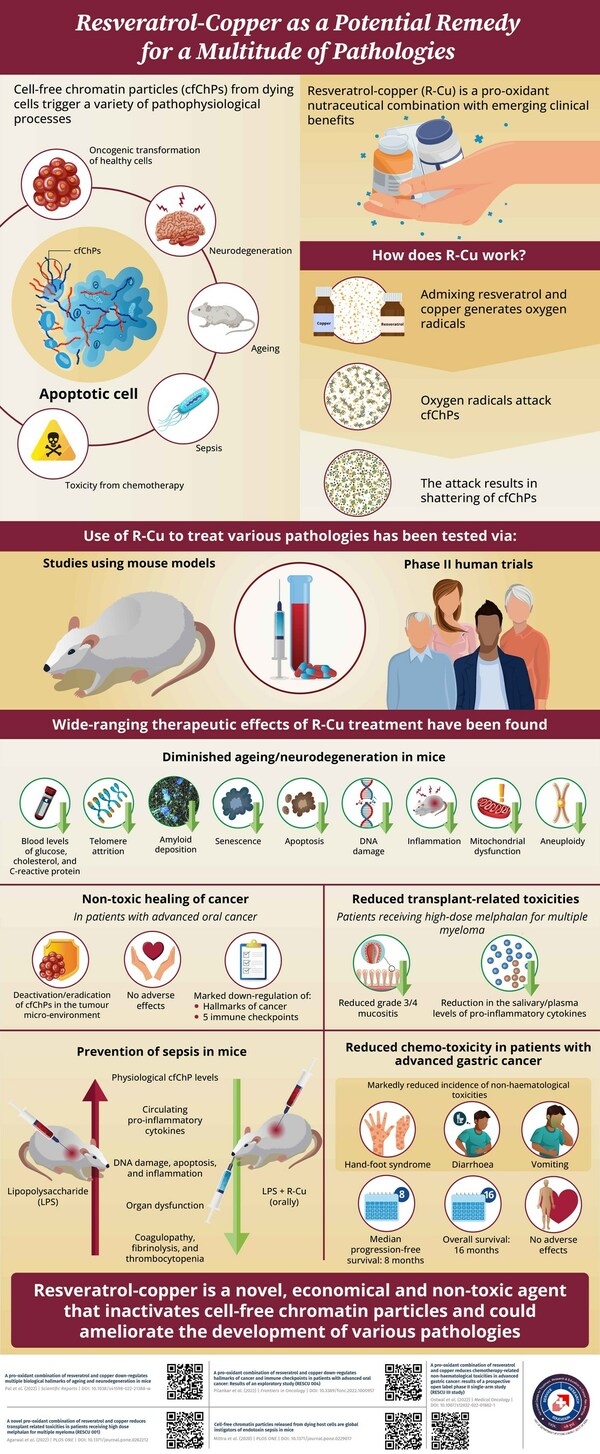Research from India’s Tata Memorial Centre suggests that free radicals (ROS) generated upon mixing two nutraceuticals—resveratrol and copper—can help ameliorate various diseases by inactivating cell-free chromatin particles
MUMBAI, India, Jan. 17, 2023 /PRNewswire/ — Chromatin comprises a complex mixture of DNA and proteins and forms the structural basis of chromosomes in the cellular nuclei. When cells die, they release cell-free chromatin particles or “cfChPs” into the circulatory system. Emerging evidence indicates that cfChPs exert toxic effects by damaging the DNA of healthy cells and activating pro-inflammatory processes. Researchers from the Advanced Centre for Treatment, Research & Education in Cancer (ACTREC), Tata Memorial Centre (TMC), India, have recently demonstrated therapeutic benefits of a pro-oxidant mixture of resveratrol and copper, R-Cu, in patients undergoing chemotherapy for advanced gastric cancer. Combining R with Cu (R-Cu) leads to the generation of free oxygen radicals which can inactivate the offending cfChPs.
Professor Indraneel Mittra, Dr. Ernest Borges Chair in Translational Research and Professor Emeritus, Department of Surgical Oncology at TMC/ACTREC, tells us how his team “launched a single-arm phase II clinical trial to study the effect of R-Cu in reducing the toxic side effects of chemotherapy by cfChP inactivation in patients with advanced gastric cancer undergoing docetaxel-based multi-agent chemotherapy, and used a grading system for the assessment of unwanted physiological effects.”
The results were promising—although R-Cu did not reduce haematological toxicities, it markedly reduced the incidence of non-haematological toxicities comprising hand-foot syndrome, diarrhoea, and vomiting. Moreover, R-Cu reduced docetaxel exposure compared to the control arm without affecting efficacy in terms of overall survival.
This study was supported by Department of Atomic Energy, Government of India, through its grant CTCTMC to Tata Memorial Centre, awarded to Prof. Mittra.
Prior to this, two studies from Prof. Mittra’s group used mouse models to demonstrate the benefits of R-Cu administration in prevention of ageing and sepsis. The first of these indicated that the cfChPs that are released from the billions of cells that die in the body every day and damage healthy cells is the underlying cause of ageing, and prolonged oral administration of R-Cu leads to the downregulation of multiple biological parameters of ageing including neurodegeneration, which is associated with Alzheimer’s disease. The other study showed how cfChPs trigger sepsis after bacterial infection in mice; administering R-Cu prevented this pathological process, including the prevention of fatality.
The research group has also conducted human studies. One of their previous works suggested that cfChPs released from dying cancer cells enter surrounding surviving cancer cells, trigger DNA damage and inflammation, and further contribute to their aggressive behaviour—effects that could be mitigated by R-Cu administration. Another study reports reduced grade 3/4 mucositis and reduced levels of inflammatory proteins (or “cytokines”) in the serum and saliva of R-Cu-treated patients receiving bone marrow transplants with high-dose melphalan—a chemotherapeutic used to treat plasma cell cancers.
Dr. Mittra, who is the corresponding author of these articles, concludes, “Our evidence suggests that R-Cu can be a novel, cost-effective, and non-toxic agent which can be used for multiple disease conditions including cancer and metastasis prevention.”
Title of original paper: A pro-oxidant combination of resveratrol and copper reduces chemotherapy-related non-haematological toxicities in advanced gastric cancer: results of a prospective open label phase II single-arm study (RESCU III study)
Journal: Medical Oncology
DOI: https://doi.org/10.1007/s12032-022-01862-1
Contact:
Indraneel Mitra
+91-9769769720
352117@email4pr.com
SOURCE Advanced Centre for Treatment, Research & Education in Cancer (ACTREC)


